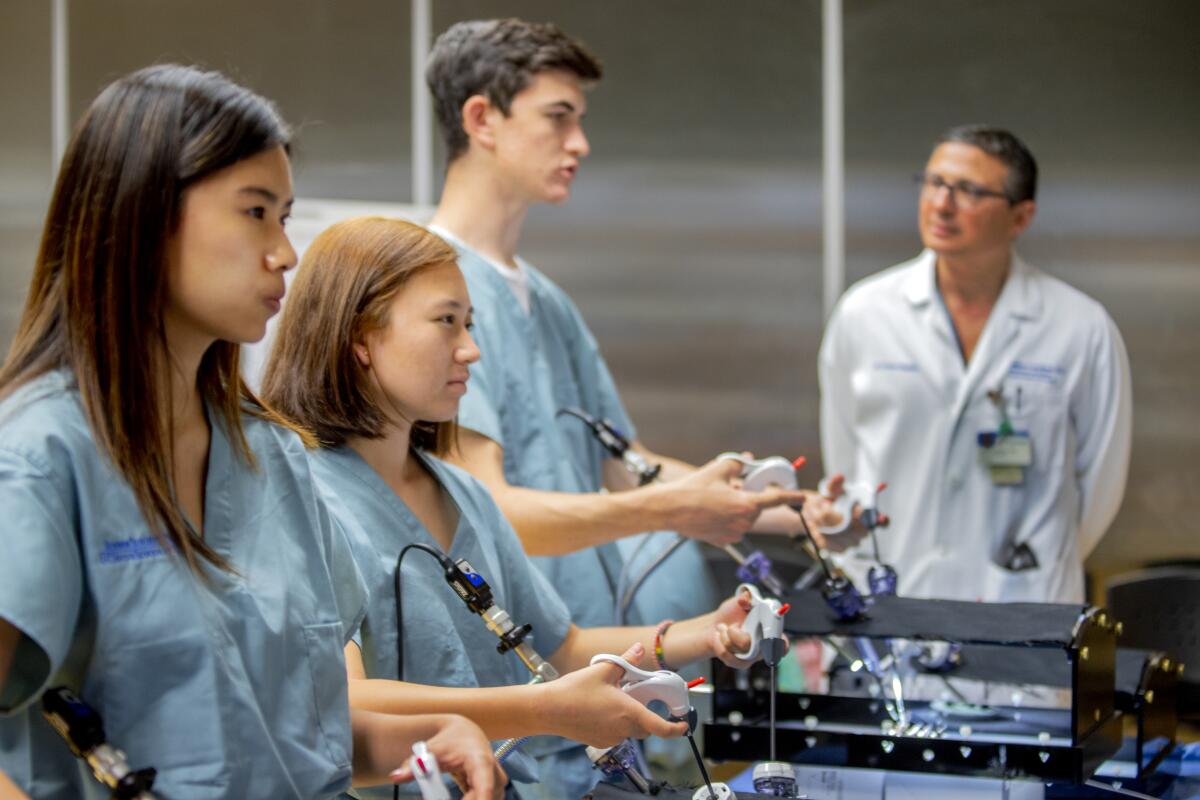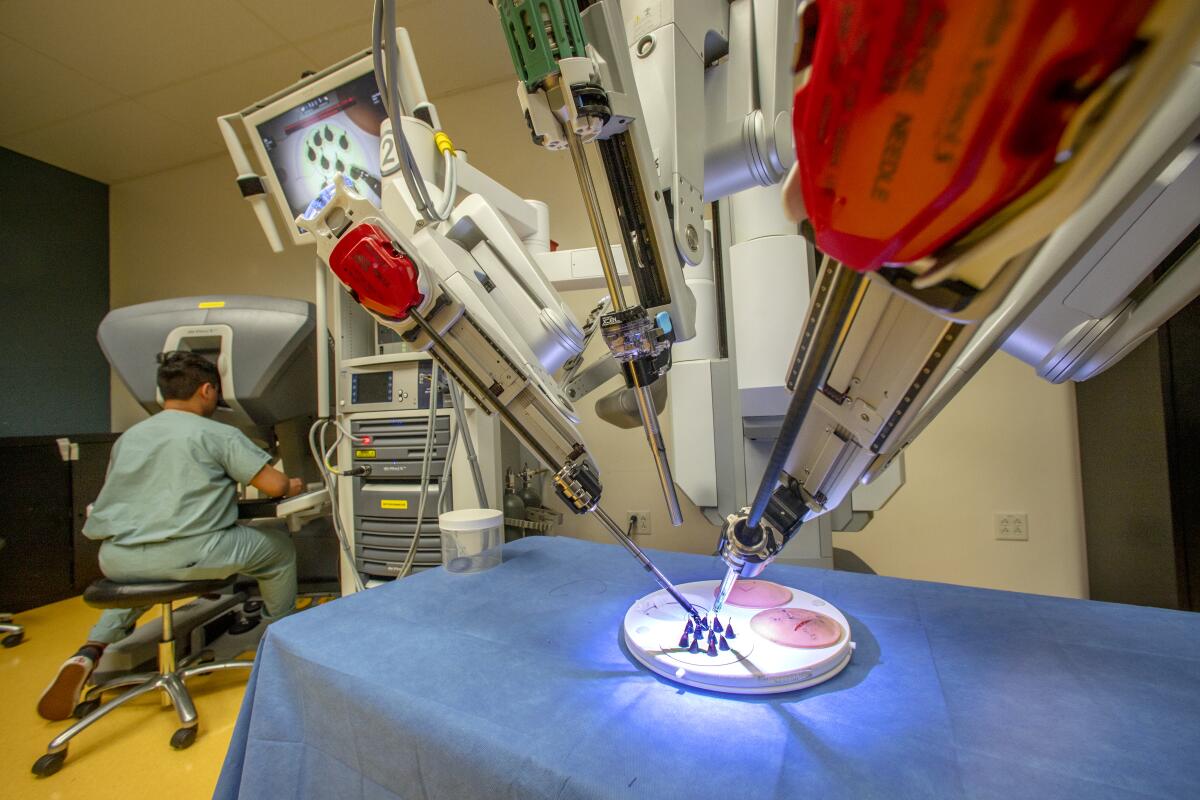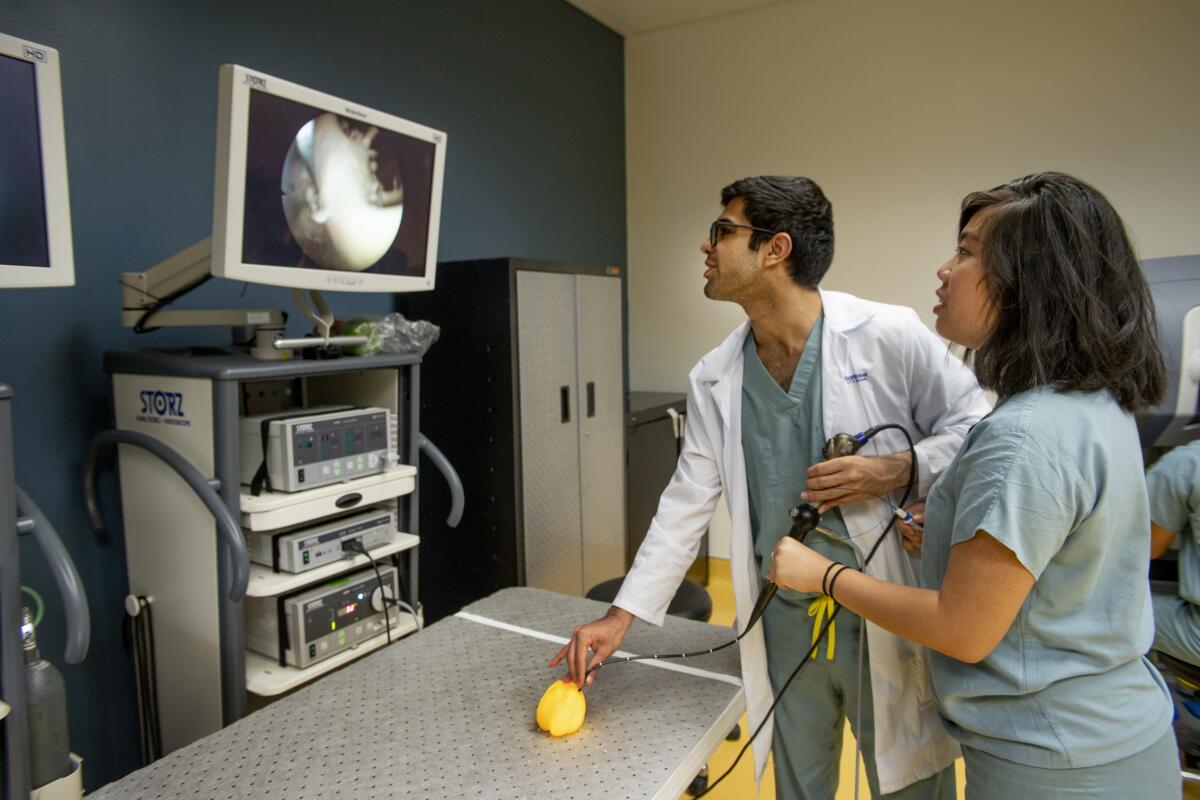High school students try their hands as surgeons during summer program at UCI Medical Center

- Share via
It’s quiet in the basement of the UC Irvine Medical Center.
The youngest residents of the research hospital in Orange are hard at work on a Monday afternoon. A machine maneuvers thread through small, metal loops. Sutures are carefully made and tied into soft tissue and steady hands stealthily draw “kidney stones” (seeds in reality) out of yellow bell peppers.
This surgical education center is probably the closest to an actual operating room that many of these students have ever been — mostly because they haven’t yet survived medical school, or even graduated from high school for that matter.
UCI Medical Center hosts the annual summer program to provide a “hands-on” opportunity for students age 16 and older to explore the medical and surgical fields.
Participants have the opportunity to learn basic surgical skills, anatomy and how to perform CPR, as well as receive basic life support certifications over the two-week course. Providing support throughout the program is a team of medical students and college mentors — some of whom previously went through the program.
Students also are able to enter operating rooms and observe UCI surgeons, as well as use the daVinci Surgical System, which facilitates minimally invasive procedures and eliminates the slight tremor of a human hand, according to Nicole Givenrod, the summer surgery program director.

Two sessions, each capped at 24 students, are held every summer. The first is typically geared toward local high school students, Givenrod said, while the second includes applicants from outside Orange County.
Jane Wang, 16, came from Monta Vista High School in the Silicon Valley city of Cupertino to participate in the program. She said she has always been interested in surgery and plans to attend medical school and focus on cardiosurgery, pediatrics or neurosurgery — “because the brain controls basically every single function of your body.”
Claire Chen, an incoming junior at Mission San Jose High School in Fremont, said she heard about the program from friends who said they became interested in pursuing medical careers after participating.
“I was always interested in [biology], and I didn’t know if I wanted to do medicine yet, but after this [program] I feel like I learned a lot more about surgery and how everything works,” she said.
Both Chen and Wang said their favorite part of the summer program so far has been observing surgeries in the operating room.
“You see [operating rooms] in movies or TV shows like ‘Grey’s Anatomy’ and ‘Scrubs’ and they don’t truly depict what the actual OR looks like or how these types of surgeons are in the OR,” Wang said.
Applicants for the program must have a minimum GPA of 3.5 and take part in an interview. The cost to participate is about $4,550 per student, or $5,850 with room and board for those from outside of Southern California.

Dr. Jaime Landman, chief supervisor of the summer surgery program, said the team gives out scholarships — including six this year — to pay for some of the students.
The program dates back to 2012 and was created under the direction of Landman, a UCI professor who also chairs the urology department.
Landman said he was inspired to begin the program because he felt the community of young people — “summer surgeons” as he puts it — was being underestimated.
The theme of the program is focused on innovation, Landman said, and students are encouraged to note specific problems that occur during surgery. After identifying those issues, students need to think of a solution. Working in groups of five, participants present their ideas the day they finish the program.
After the initial pilot seven years ago, Landman said the students “blew my mind.”
The real beauty of the program, he said, is empowering students to come up with ideas to improve a complex situation.
“The amazing thing is that we’re putting younger people into a very stressful, challenging environment, so we make them aware that everybody having surgery, really, is having the worst day of their life, potentially,” he said. “[Patients] are scared or anxious. They have cancer or an infection or some disease that’s terrible, enough that they need surgery for it. [The students] understand that. They behave great ... and they do get a lot of training.”
He also joked that the team tried to make the program as “un-action-packed” as possible.
“It’s an administratively laborious process, but I think that’s important because they need to understand that if you really care to go into medicine, there’s a lot of administrative challenges — unlike the fun TV shows where a lot of action-packed things happen one after another,” he said.
All the latest on Orange County from Orange County.
Get our free TimesOC newsletter.
You may occasionally receive promotional content from the Daily Pilot.




